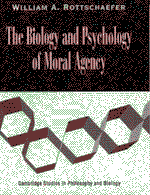Book contents
- Frontmatter
- Contents
- Preface
- Introduction
- PART I MORAL AGENCY AND SCIENTIFIC NATURALISM
- PART II THE BIOLOGICAL BASES OF MORAL AGENCY
- PART III THE PSYCHOLOGICAL BASES OF MORAL AGENCY
- PART IV A SCIENTIFIC NATURALISTIC ACCOUNT OF MORAL AGENCY
- 8 The adequacy of moral beliefs, motivations, and actions: How can biological and psychological explanations serve as justifications?
- 9 Moral ontology: What is the ontological status of moral values?
- PART V INTEGRATING A PERSONALISTIC AND NATURALISTIC VIEW OF MORAL AGENCY
- References
- Index
9 - Moral ontology: What is the ontological status of moral values?
Published online by Cambridge University Press: 19 September 2009
- Frontmatter
- Contents
- Preface
- Introduction
- PART I MORAL AGENCY AND SCIENTIFIC NATURALISM
- PART II THE BIOLOGICAL BASES OF MORAL AGENCY
- PART III THE PSYCHOLOGICAL BASES OF MORAL AGENCY
- PART IV A SCIENTIFIC NATURALISTIC ACCOUNT OF MORAL AGENCY
- 8 The adequacy of moral beliefs, motivations, and actions: How can biological and psychological explanations serve as justifications?
- 9 Moral ontology: What is the ontological status of moral values?
- PART V INTEGRATING A PERSONALISTIC AND NATURALISTIC VIEW OF MORAL AGENCY
- References
- Index
Summary
FROM EPISTEMOLOGY TO METAPHYSICS
In the previous chapter, I was pursuing epistemological issues, in particular, an integrationist model for the justification of moral beliefs. One of my major claims was that justification should be understood in terms of reliable mechanisms that enable the acquisition of approximately true moral beliefs. We can take it for granted that if we hang around with epistemology for very long, her companion metaphysics will show up. In fact, issues of truth are ones that often bring metaphysics around. So it will behoove us, for a number of reasons, to turn now to the metaphysical issues that have been lurking around our epistemological discussions.
Although none of the classical views on truth we have examined thus far are necessarily antithetical to a realist view, the correspondence view is the one that seems to fit best with a realist position, that is, roughly, the view that true beliefs correspond with a reality that is independent of the ways that we might conceive of it in our thinking or theorizing and independent of the ways in which we might desire or wish it to be. Although one might rightly suppose that integrationists have a certain affinity for both scientific realism and moral realism, it is easy to see that that combination is not the only one available to an integrationist.
- Type
- Chapter
- Information
- The Biology and Psychology of Moral Agency , pp. 216 - 252Publisher: Cambridge University PressPrint publication year: 1997



